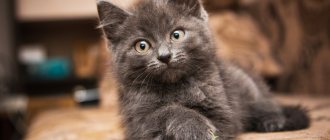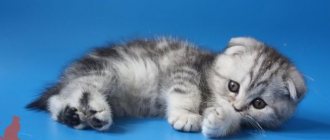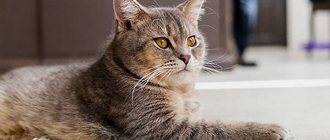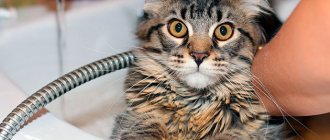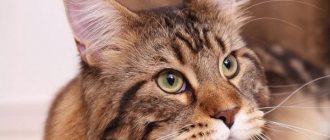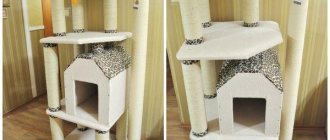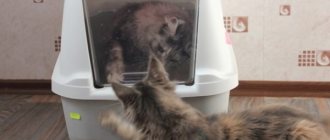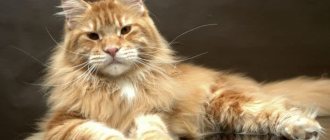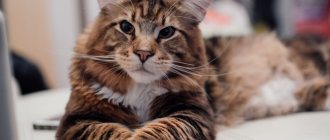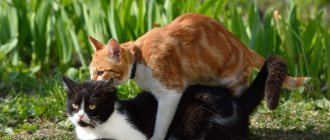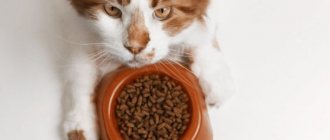Why castration is needed, pros and cons
Castration is an operation as a result of which a cat loses its testes (testicles). The animal’s hormonal background changes, libido drops, the pet stops marking its territory and screaming at night, demanding the cat’s attention.
Under the influence of sex hormones, animals require communication with the opposite sex. This is a natural behavior necessary for the continuation of the cat family. If the cat lives in a private house, then there are no problems with the implementation of the program for the reproduction of offspring. But in an apartment, a clash of interests inevitably arises. The owner is irritated by the endless night meowing, and the poor animal cannot do anything about its instincts. It is in this case that all veterinarians recommend castrating your pet. There will be no particular harm, but there will be much more positive aspects.
If you are not going to breed the breed and sell kittens, then it is better to castrate your Maine Coon. This will not only save the animal from suffering, but will also improve the quality of life of both the cat himself and the rest of the household.
Pros of the operation
- No late-night concerts or noxious aroma coming from cat marks.
- Improvement of character, reduction of aggression during the period of spring exacerbation.
- Increasing your pet's lifespan. According to statistics, neutered Maine Coons live several years longer than their “dignified” counterparts.
- Reducing the risk of developing some serious diseases. Castration – prevention of prostatitis and prostate adenoma.
- There is no chance of contracting infectious diseases that affect most yard animals. Sexual instincts push well-groomed and healthy pets to rash actions - running away from home and mating with street cats. With close contact, your pet may “catch” an infection, the treatment of which will fall on the shoulders of the owner.
In general, neutered animals are more focused on communicating with humans rather than seeking adventure. Entertainment such as fights with competitors over defending territory and intimate meetings under the moon are no longer of interest to the cat after the operation. Sexual desire fades away and is replaced by the second most important instinct - nutrition. The most important thing here is to monitor the balance of the diet and not to overfeed the animal, then the risk of urolithiasis will decrease.
Why is it necessary?
It is recommended to castrate a Maine Coon cat for the following reasons:
- Unpleasant odor due to cat marking territory.
- Fights with rivals, during which the cat can be seriously injured.
- Severe stress due to the fact that there is no way to satisfy the reproductive instinct.
- After castration, life expectancy increases approximately 1.5 times.
- The cat stops focusing on the reproductive instinct and begins to develop other interests.
Maine Coon cats are sterilized mainly in order to get rid of periodic estrus, as well as to minimize the risk of the animal developing diseases of the reproductive system.
Age for castration of a Maine Coon
The optimal age for castration of a Maine Coon, according to most veterinarians, is 7-9 months. It cannot be stated unequivocally that the operation should be performed only at this time. Some animals mature much later, so castrate them later. The question is whether to have time to remove the reproductive organs before the animal reaches puberty. The fact is that after 9 months of age, testosterone is produced not only by the testes, but also by the pituitary gland, as well as the adrenal glands. Castration at a late age is fraught with long-term changes in hormonal levels (more than six months). During all this time, the four-legged friend will continue to mark territory, organize nightly concerts and demand communication with the opposite sex.
Up to 7 months, the kitten’s body develops very quickly, which is accompanied by the formation and growth of all organs and systems. It is undesirable to perform the operation during this period, since after the intervention the genitourinary system, in particular the genital organ and urethra, stops developing. If the animal is healthy, then there will be no discomfort. However, underdevelopment of organs in urolithiasis makes treatment difficult.
Maine Coons can be castrated up to 7 months, provided that the animal's weight exceeds 3 kg.
In old age (over 7 years), surgery should be performed only after a complete examination of the animal’s health. If problems with the kidneys, heart or liver are detected, castration is not recommended due to the high risk of complications.
What are the options?
Often, compassionate owners strive to preserve their pet’s opportunity to experience the joys of sex and motherhood and reject castration. Such sentimental measures make everyone suffer, because there is not much to solve the issue of creating humane conditions for an animal suffering from hormonal desire:
- You can try organizing a date with your furry friend. After this, it will be necessary to take care of providing a place of residence for new coons or just outbred kittens.
- Use special veterinary medications. These can be herbal tinctures or hormonal contraceptives. Herbal remedies become addictive very quickly, and the use of chemicals is stressful for cats and can lead to a decrease in the animal’s immunity.
Important! The use of feline contraceptives disrupts the endocrine system and provokes cancer.
Castration allows you to maintain the health of the pet and the nerves of the owner. The operation, performed under general anesthesia, does not bring suffering to the animal, and the cessation of hormonal attacks has a beneficial effect on the animal’s body.
Many owners who initially resisted the idea of castration and then decided to do it as a last resort under the influence of the animal’s screams note how much the Maine Coon’s character has improved.
How is the operation performed?
Castration is carried out by a qualified veterinarian in a trained and well-equipped operating room. It is undesirable to operate at home, since the risk of wound infection increases in conditions of insufficient sterility of the room.
At the first stage, the veterinarian shaves (plucks) the hair on the scrotum, and then treats the surgical field with antiseptics. There are two ways to operate: closed and open.
In the first case, the doctor acts according to the following scheme:
- Cutting the skin with a scalpel;
- Extraction of the testis and appendage from the surgical wound;
- Ligation of the cord, covered with the common vaginal membrane, with two ligatures of thin catgut;
- Cutting off the testis along with part of the spermatic cord 1 cm above the lower ligature;
- Checking the reliability of ligatures;
- Resection of the second testis through a second incision in the scrotum;
- Introduction of antiseptic ointment.
Open operation:
- Dissection of the scrotal tissue with a scalpel simultaneously with the vaginal membrane;
- Extraction of the testis and appendage from the surgical wound;
- Separation of the spermatic cord and sperm duct;
- Formation of a biological node (parts of the testis are connected to each other several times (4-6);
- Excision of the second testis;
- Antiseptic treatment.
No stitches are applied, the wound heals by secondary intention. In most cases, the animal’s rehabilitation lasts 1-2 days, and complications arise in rare cases.
Maine Coon care after surgery
The rehabilitation period of a Maine Coon after castration lasts for 48 hours. During this period, the animal should not be fed or disturbed. You should allocate a prominent place for the cat (preferably near the radiator) on the floor (not on a chair!!!), lay an absorbent diaper under it and cover it with a diaper.
In the first few hours after the operation, the animal will recover from anesthesia and may behave inappropriately: crawl or run to a secluded place, show aggression, meow pitifully, and hide from its owners. During this period, you need to monitor the safety of your pet so that it does not fall, get hurt, or cause harm to itself. In some cases, a special collar or blanket may be required to prevent the tailed animal from licking the wound. Ideally, the room where the cat is recovering after surgery is twilight - bright light irritates the eyes, which creates discomfort.
The animal needs to be fed the day after castration. If the kitten refuses to eat, then he is given liquid food using a pipette. It is very important to provide your pet with enough water, as his body needs to replenish its water balance.
The surgical wound is not sutured, so during the rehabilitation period the cat's litter box should be replaced with absorbent napkins or diapers to prevent inflammation or wetting of the wound. In the first hours after surgery, a small amount of blood may be released. This is not critical, but if the bleeding not only does not stop, but also intensifies, you should urgently call a doctor.
Sterilization of cats
Sterilizing a cat is more difficult.
This is an abdominal operation, also performed under general anesthesia. There are two methods of sterilization - tubal ligation and removal of the ovaries, uterus and fallopian tubes. The first method only prevents the cat from becoming pregnant, leaving all hormonal and psychological problems unresolved, so it is recommended to perform the operation using the second method. After surgery, the cat needs postoperative care for several days - treatment of sutures. To prevent infection from getting into the fresh stitches, the cat is put on a special blanket with ties on the back, covering the pet’s stomach and chest. After approximately 10 days, the sutures are removed and the animal returns to its normal life.
During the first time after surgery, it is advisable to keep the Maine Coon constantly in sight and not allow the animal to jump or run until the wounds and stitches heal.
Useful to read: All about shedding in Maine Coons
Diet of a neutered pet
There is a myth that castration leads to the development of urolithiasis. This is not entirely true. The appearance of stones and sand in the kidneys is caused by poor nutrition, the predominance of phosphorus- and magnesium-containing foods in the diet, as well as lack of physical activity and insufficient drinking regimen.
Urolithiasis can also occur in an uncastrated cat. It has been noticed that operated animals love to eat more and suffer from obesity. And this is precisely what increases the risk of developing urolithiasis in castrates. The disease can be provoked by castration at an early age (up to 6-7 months), due to which the lumen of the urethra narrows and deposit crystals cannot come out with urine.
In order to prevent ICD and keep your pet healthy, you should:
- Do not overfeed, giving in to the immediate desire to please your pet.
- Feed in portions with special food for castrated animals. They contain substances that can reduce the acidity of urine.
- In a normal diet, exclude fish, as well as foods high in phosphorus, magnesium and calcium.
- Give preference to wet food.
- Maintain drinking regime.
- Give vitamins regularly.
- Be examined in a clinic to prevent urolithiasis.
New life for a cat
After the operation, when all the stitches on the soul and body of the coon have healed, a new stage in the pet’s life together with its owner begins. If the animal was castrated as an adult, sexual behavior may still be observed for some time. Its cause is now habit, not sex hormones.
Timely surgery greatly simplifies the life of your furry companion, allowing him to live peacefully without unnecessary suffering from unfulfilled physiological needs.
The tendency of neutered cats to become extremely obese has been greatly exaggerated. If the owner pays attention to the pet’s nutrition and creates conditions for the coon’s physical activity, excess fat does not accumulate.
When choosing food and portion sizes, you must take into account that your pet's metabolic rate has slowed down somewhat, and he needs to reduce his caloric intake by a third. It is acceptable to use special food for feeding cats.
Contraindications to castration
In most cases, veterinarians are “FOR” castration, unless the animal is a representative of a rare breed and is not intended for mating. Surgery is not recommended in several cases:
- Having heart, kidney or liver disease.
- Old (over 7 years) or early (up to 6 months) age.
- Allergy to anesthesia medications.
Contraindications are not absolute, so an experienced veterinarian will be able to find a solution to the problem. For example, there are methods of medical castration (insertion of an implant) that will allow you to restore the animal’s ability to reproduce if necessary.
Whether to castrate a Maine Coon or not is the choice of the animal owner. If you are ready to put up with night concerts and organize cat romantic meetings on your territory, then surgery is not necessary. But what to do with the pungent smell of tags, which literally permeates the entire apartment? Or the wild howls of your beloved cat, preventing you from resting peacefully on your legal day off? In an apartment it is difficult to put up with such discomfort. And it is in such cases that veterinarians advise castrating the animal.
